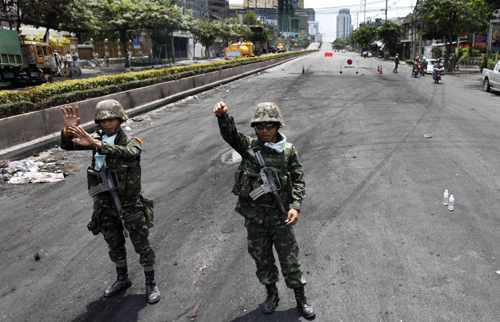World
Thai PM: No early elections until violence ends
(Agencies)
Updated: 2010-05-23 15:33
 |
Large Medium Small |
 |
|
Thai soldiers direct the traffic at the site of recent clashes between anti-government "red shirt" protesters and Thai troops in central Bangkok May 22, 2010. [Agencies] |
BANGKOK - Thailand's leader said Sunday that new elections can be considered only after violence and protests by anti-government activists end completely, after two months of turmoil left at least 85 people dead and deeply divided the country.
The comments by Prime Minister Abhisit Vejjajiva indicated that he will continue to take a tough line against the Red Shirt protesters and will not make a grand gesture of announcing immediate elections to heal the rift, as some had expected. Under Thai law, Abhisit is not obligated to hold new polls until December 2011.
|
"At the moment, no one can tell when is the best time. We don't know what will happen next. There are some people still talking about continuing their fight and to hold a protest in June. We will have to see what happens first" before thinking of elections, he said.
The Thai capital was gripped with its worst political violence in decades during the Red Shirt occupation of downtown Bangkok, culminating in the military crackdown that sparked a rampage by supporters who launched grenade attacks and set fire to landmark buildings, including the country's stock exchange and biggest shopping mall.
At least 16 people were killed in the final offensive Wednesday and more than 100 were wounded. Another 69 died and more than 1,300 injured in previous clashes. Most of the dead were protesters shot by troops.
A majority of Red Shirt protesters are from the impoverished rural north and northeast, who say the Oxford-educated Abhisit and his government is elitist and came to power illegitimately. They say they are fighting for democracy and want immediate dissolution of parliament and new elections.
In a bid to appease the protests Abhisit had earlier this month offered to hold elections on November 14, but the reconciliation plan fell through when Red Shirt leaders made more demands. All but two top leaders are now in custody although no charges have been filed yet.
"I never rejected dissolving Parliament before the end of its term. When I proposed ... November 14 as election date I was hoping that everyone will join in this process. But ... the election should be held in a peaceful atmosphere without violence," he said.
On Sunday, hundreds of schoolchildren and residents joined municipal workers at the former protest sites of Red Shirts in Bangkok's fashionable Rajprasong area to clean up the mess left behind. Children cleaned anti-government graffiti, removed posters and washed sidewalks to remove weeks of accumulated grime.
"I was shocked at first after seeing what the place has become, but then I felt pumped up after seeing a lot of Bangkok residents coming out to help," said Wannaporn Sukhonpan, 40, wearing waterproof boots and a face mask.
"I hold no grudge against those who've done this. This is not the time to be angry. This is the time for unity to help bring back our city to the point where it used to be."













